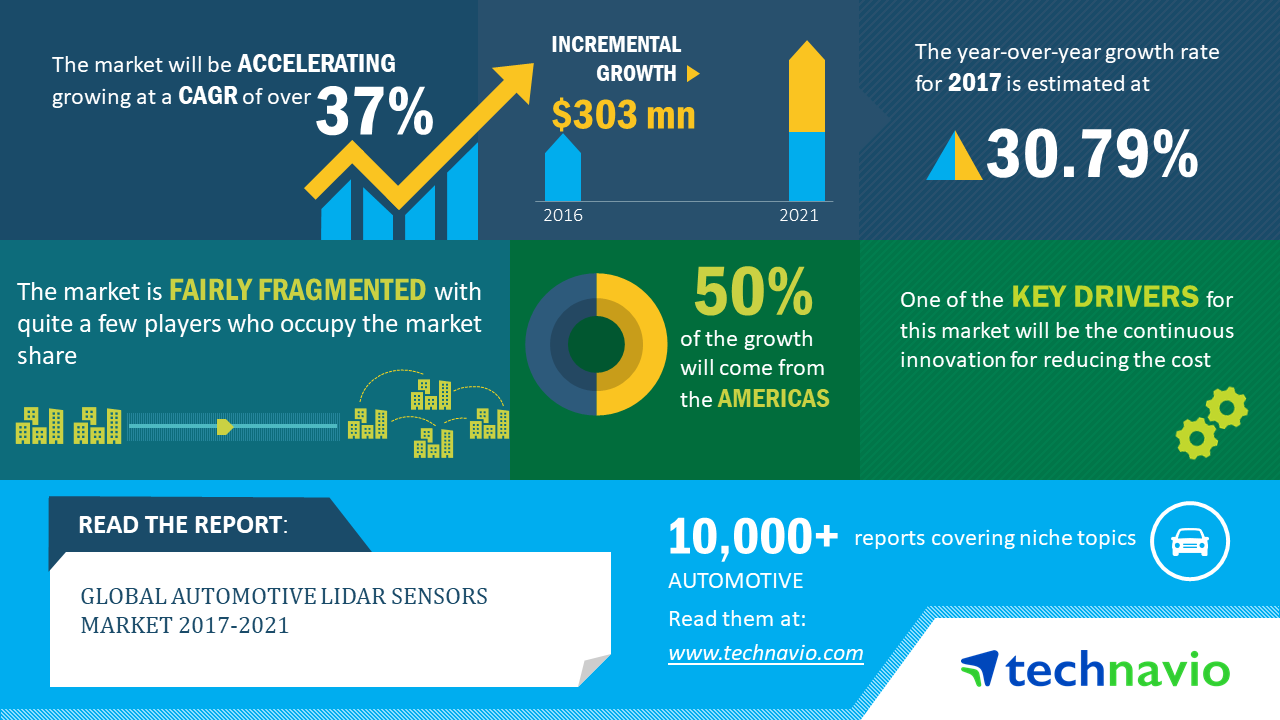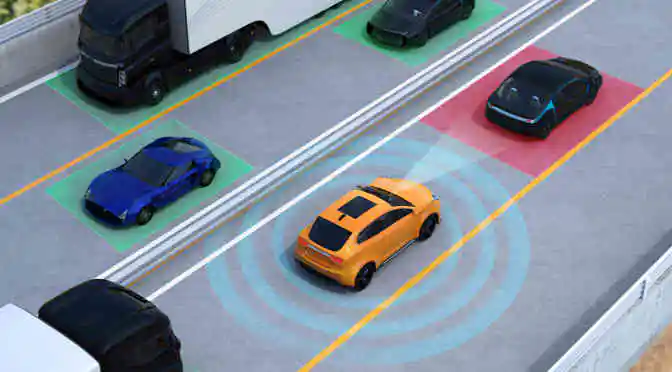Technology has taken the world by storm, and the automotive industry is at the leading edge of innovation with the constant development of technologies in the area of autonomous cars. At the heart of self-driving technology is LiDAR (light detection and ranging), a vehicle-vision system that measures distance by illuminating a target using light and lasers as its primary sensor; automotive LiDAR sensors are what allow driverless cars to see.
Because this technology is so useful to the automotive industry, the market for automotive LiDAR sensors is expected to grow substantially, creating many opportunities for vendors.

LiDAR sensor technology is sure to be significant in any autonomous system offered to the public. The near-certain future of ubiquitous autonomous driving has companies of all sizes rushing to develop the automotive LiDAR sensor system and other technologies that will put them at the forefront of the industry.
Top 8 Automotive LiDAR Sensors Companies in the Global Market 2018
1. Quanergy
From real-time mapping and navigation to recording the data as a reproducible three-dimensional point cloud, Quanergy’s breakthrough LiDAR sensors are paving the way to the top position in the automotive LiDAR sensors market. The company’s LiDAR sensing technology is leading in all six crucial commercialization areas, which include price, reliability, performance, weight, size and power consumption.
Recently, the company began receiving attention with their claims about making their systems available for as low as US$100. Compared to their competitor’s automotive LiDAR sensors, which sometimes cost upwards of $10,000. Quanergy’s S3 solid state LiDAR sensors precisely create a real-time and long-range 3D view of its surroundings and provide the ability to recognize objects with high accuracy.
Weighing less than 10 ounces and tiny enough to fit in the palm of one’s hand, the reliable and affordable S3 is a vital cog in the emergence of autonomous vehicles.
Find out Quanergy’s market share in the global Automotive LiDAR Sensors Market
2. Velodyne
Founded in 1983, Silicon Valley-based Velodyne is regarded as a LiDAR pioneer after developing some of the first LiDAR sensors for industrial systems. The company made headlines when two of the leading multinational companies Ford and Baidu committed to investing US$150 million into the company, their first funding round.
In 2017, Velodyne announced its new solid-state LiDAR system, Vellarray sensor, a cost-effective yet rugged and high-performance automotive product in small form factor. With the Velarray LiDAR sensor, which can be seamlessly embedded in both advanced driver-assist safety (ADAS) systems and autonomous vehicles, Velodyne LiDAR is again setting new industry standards for functionality delivered in smaller and more cost-effective ways.
3. LeddarTech
Backed by multiple agreements with top automotive industry vendors and a recent investment of $101 million from strategic partners, Canada-based LeddarTech is setting itself apart from other LiDAR providers with its unique business approach. Developed after 10+ years of research and development, Leddar is a unique combination of cutting-edge software algorithms and advanced lightwave digital signal processing that enable the production of solid-state LiDAR sensors. The latter ensures reliability and superior performance at a highly competitive price.
Recently, LeddarCore LCA2 won the ‘best of innovation award’ at the CES 2018 event in two categories: Self-Driving technology and Embedded Technologies. This revolutionary product is the world’s first solution that permits rapid industrialization of 3D solid-state flash LiDAR sensors, meeting the automotive sector’s stringent requirements in terms of performance, cost, and reliability, in the process.
For more information about the global Automotive LiDAR Sensors market size, top automotive LiDAR sensors companies, and future trends in this market, take a look at Technavio’s Global Automotive LIDAR Sensors Market Report, or download your Free Sample Report Now.
4. Continental
Continental AG, commonly known as Continental, is a prominent German automotive manufacturing companies specializing in brake systems, tires, automotive safety, powertrain and chassis components, interior electronics and other parts for the automotive and transportation industry. Under the passenger car vehicle segment, the company offers 3D Flash LIDAR in the ADAS business segment of chassis and the safety business unit. This product is part of Continental’s automated driving offerings.
Continental has been providing short-range LIDAR for a very long time now. In 2012, the company developed SRL-CAM400, a product resulting from the combination of a camera and infrared LIDAR. The sensor module can categorize objects in front of the vehicle and detect an imminent collision. SRL-CAM400 provides robust and reliable data for initiating automatic emergency braking.
5. Luminar Technologies
Luminar Technologies, the U.S. startup founded in 2012, produces advanced LiDAR sensors for autonomous vehicles. After five years in stealth mode, Luminar Technologies has raised $36 million in seed funding, and is now emerging into the public view, in time for the self-driving industry’s boom.
The company stands out from its rivals in the automotive space because it builds LiDAR sensors from scratch. This means that Luminar Technologies engineers its own chips, lasers, and receivers without inputs from third-parties. The key benefit is that their LiDAR systems can see farther and in much greater detail than other systems presently in development.
6. Innoviz Technologies
As the autonomous vehicle market matures, Innoviz Technologies, an Israel-based company, has established itself among the industry leaders not only for their cutting-edge LiDAR solution, but also for playing a key role in the overall self-driving vehicle stack. Innoviz offers game-changing LiDAR technology that powers the company’s exclusive system, detector, and MEMS designs to give driverless vehicles greater sensing capabilities. The latter helps in challenging conditions such as varying weather conditions, bright direct sunlight, and multi-LiDAR environments.
With over 80 employees today, the company has proliferated since its incorporation in January 2016 and has achieved many milestones to help it surpass competing automotive LiDAR sensors in a short timeframe.
7. Trilumina
TriLumina Corp., the leader in pulsed, high-power, low-cost, and solid-state illumination modules for LiDAR, has demonstrated technology capable of powering a vast number of individual lasers operating in seamless synchronization at remarkably high speeds and power. The company’s infrared emitters are capable of high power illumination for LIDAR depth sensing. Its infrared emitters enable driver monitoring systems (DMS) and LIDAR for autonomous vehicles and ADAS.
TriLumina’s illumination modules are set to replace the bulky and expensive scanning LiDARs being used in today’s self-driving vehicles. High resolution sensing in a small, robust and cost-effective package, will allow the successful commercial deployment of autonomous vehicles, rendering Trilumina a key player in this development.
Read more: Automotive Lidar sensors: Where We Are and Where We’re Headed?
8. Oryx Vision
Founded in 2009, Israeli startup Oryx Vision develops solid-state solutions for autonomous vehicles. Oryx recently announced a new automotive LiDAR sensor technology that uses long-wave infrared lasers to detect objects that are on the road. The new sensor can see through sunlight and fog, something that other LiDAR systems struggle to do. Also, the Oryx sensors’ nano-antennas handle signals as a wave rather than a particle, which enables the sensor to accurately calculate the velocity of nearby objects and provide accurate detail about everything it sees.



